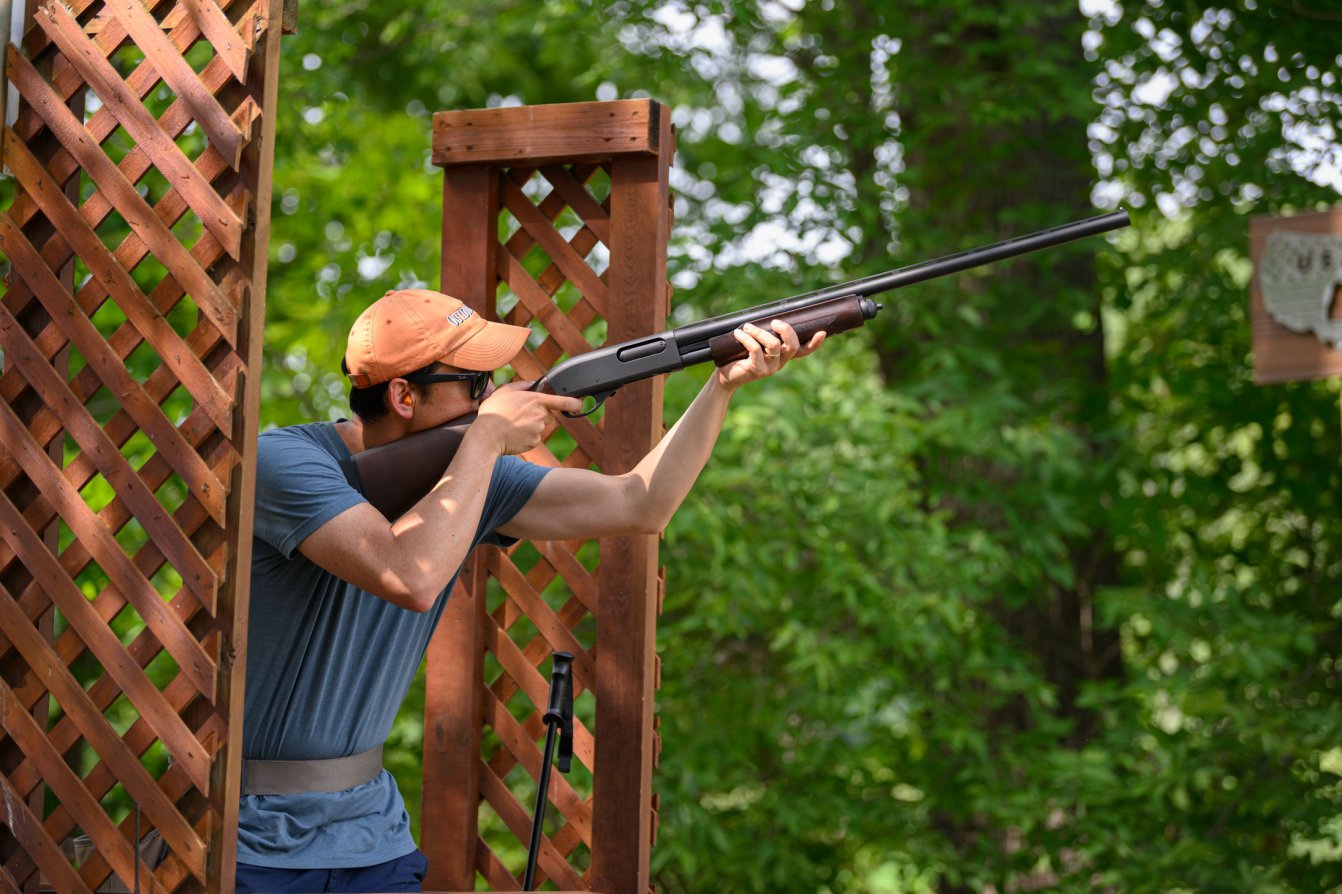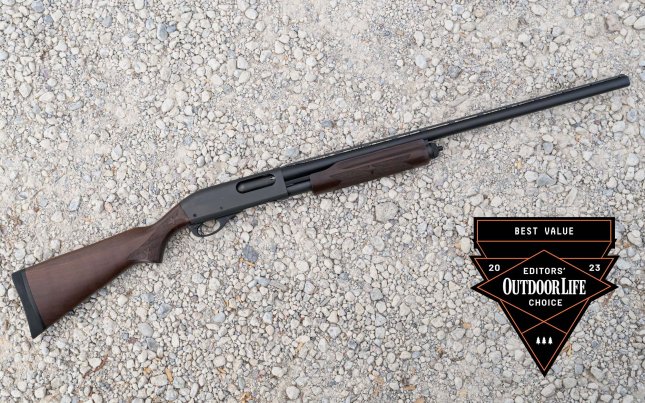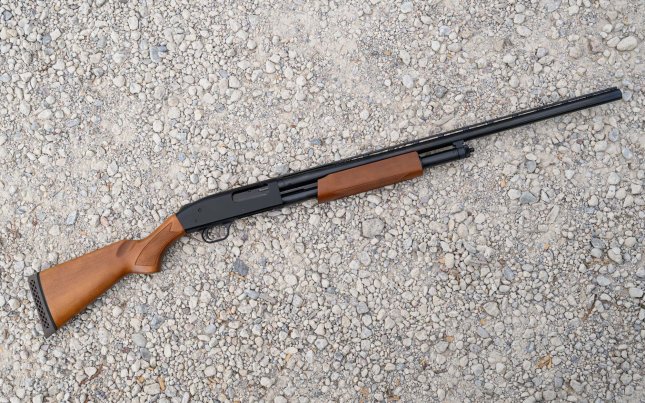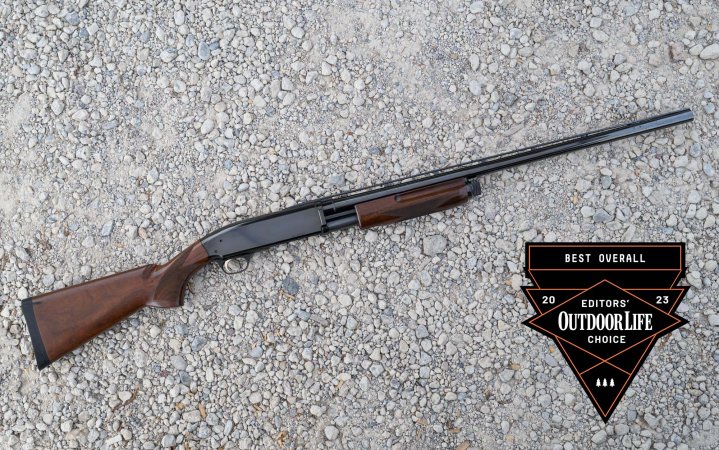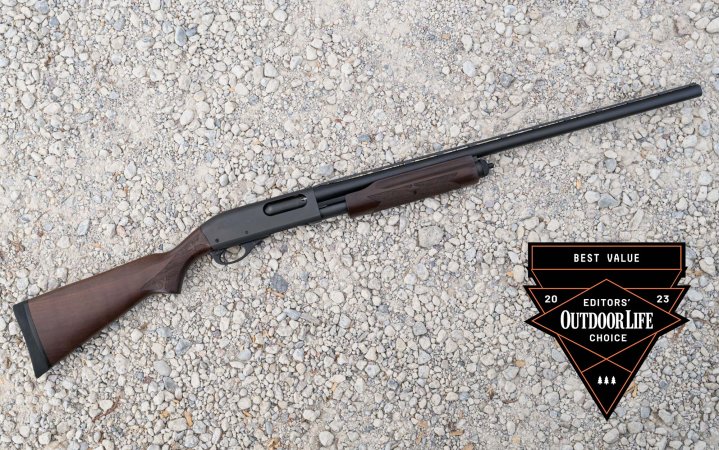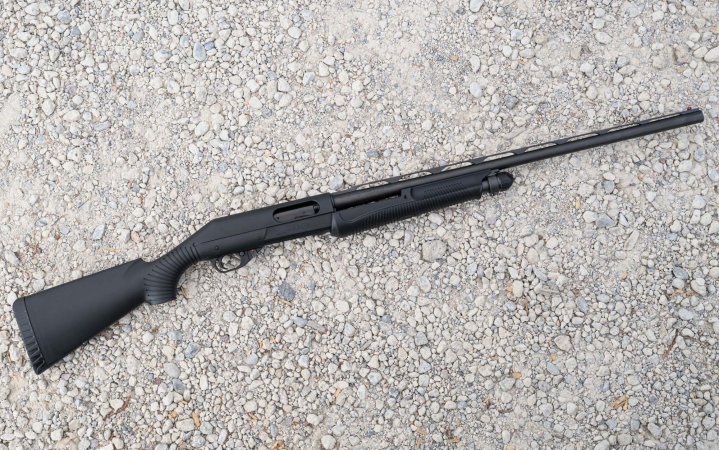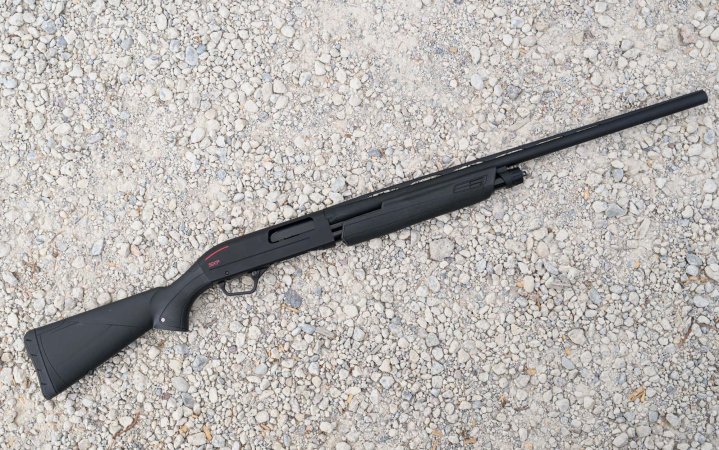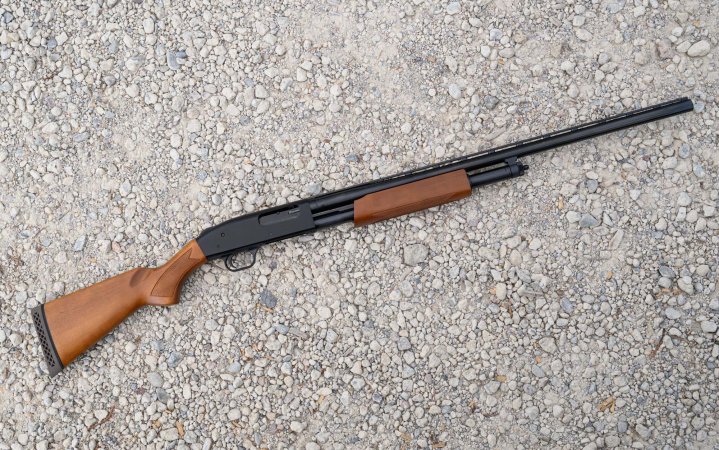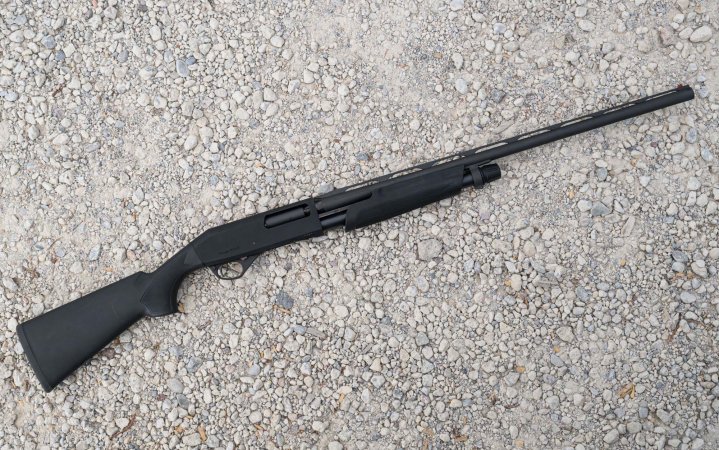We may earn revenue from the products available on this page and participate in affiliate programs. Learn More ›
Pump shotguns are the do-it-all utility players of the smoothbore world. They are affordable, durable, and ubiquitous. They are typically the first shotgun a young person is gifted (or buys) because they can pull double (or quadruple) duty for waterfowl, upland birds, clay targets, turkeys, deer, and home defense.
While there is much that is similar from one pump-gun to the next in terms of their operation and performance, not all are created equal. That’s borne out by this field that we recently tested.
The six pump shotguns we put through the paces covered a good chunk of ground in terms of price, styling, and intended purpose. We focused on guns intended primarily for bird hunting—either waterfowl or upland—and those that are readily available at a reasonable price.
Best Pump Shotguns
- Best Pump Shotgun Overall: Browning BPS
- Great Buy: Remington 870 Fieldmaster
- Benelli Nova
- Winchester SXP Black Shadow
- Mossberg 500
- Stoeger P3000
How We Tested the Best Pump Shotguns
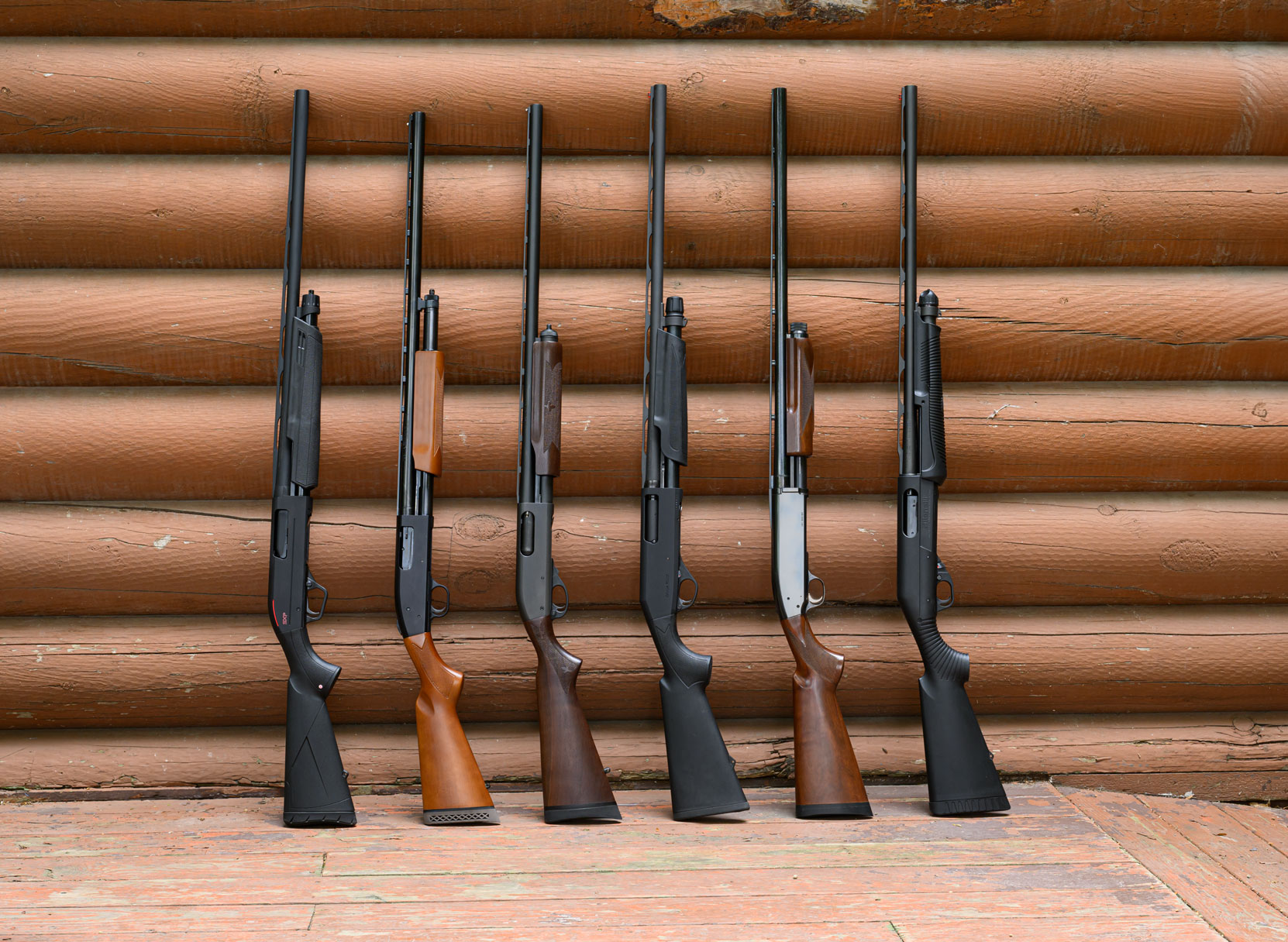
As with our roundups of the Best Shotguns, Best Rifles, Best Handguns, and Best 1911s, we convened a panel of judges consisting of Outdoor Life editors and impartial professionals to put the shotguns to the test.
This year’s team included Editor-in-Chief Alex Robinson, Executive Editor Natalie Krebs, photographer and waterfowler extraordinaire Bill Buckley, USA Shooting Olympic shotgun coach Hank Garvey, and yours truly.
We tested these guns in conjunction with our annual shotgun test at the Minnesota Horse and Hunt Club. If you want more details on our test methodology, check out that story. But here are the highlights.
Shooting with a Purpose
We judge the guns on numerous criteria, detailed below, and do so by shooting them in a purposeful manner to get a feel for these characteristics. That’s a fancy way of saying that we aren’t just trying to break targets. Instead, we hone in on specific qualities and arrive at our conclusions through a deliberate process.
Take handling, for instance. We’ll load two or three shells in all the pump guns and shoot them in rapid succession going head-to-head. We’ll repeat the process as many times as necessary to arrive at a solid judgment. This is done without worrying about whether we hit a target. Instead, we’re noting how the guns balance and swing.
We conducted similar exercises to examine how well the controls function on a gun, how easy the guns are to load and unload, how they handle recoil, the relationship between the grip and the trigger, and so on.
We also test the guns on their point of impact to see what kind of patterns they deliver and whether they are shooting true.
Panel Judging
Shooting guns in the context of their peer groups is much more illuminating than doing an individual review in a vacuum. Likewise having several judges independently testing and recording their impressions is superior to a review generated through the filter of just one person’s perspective. This mitigates the biases that a person might have toward a certain type of gun and produces more valid results.
How We Grade Guns
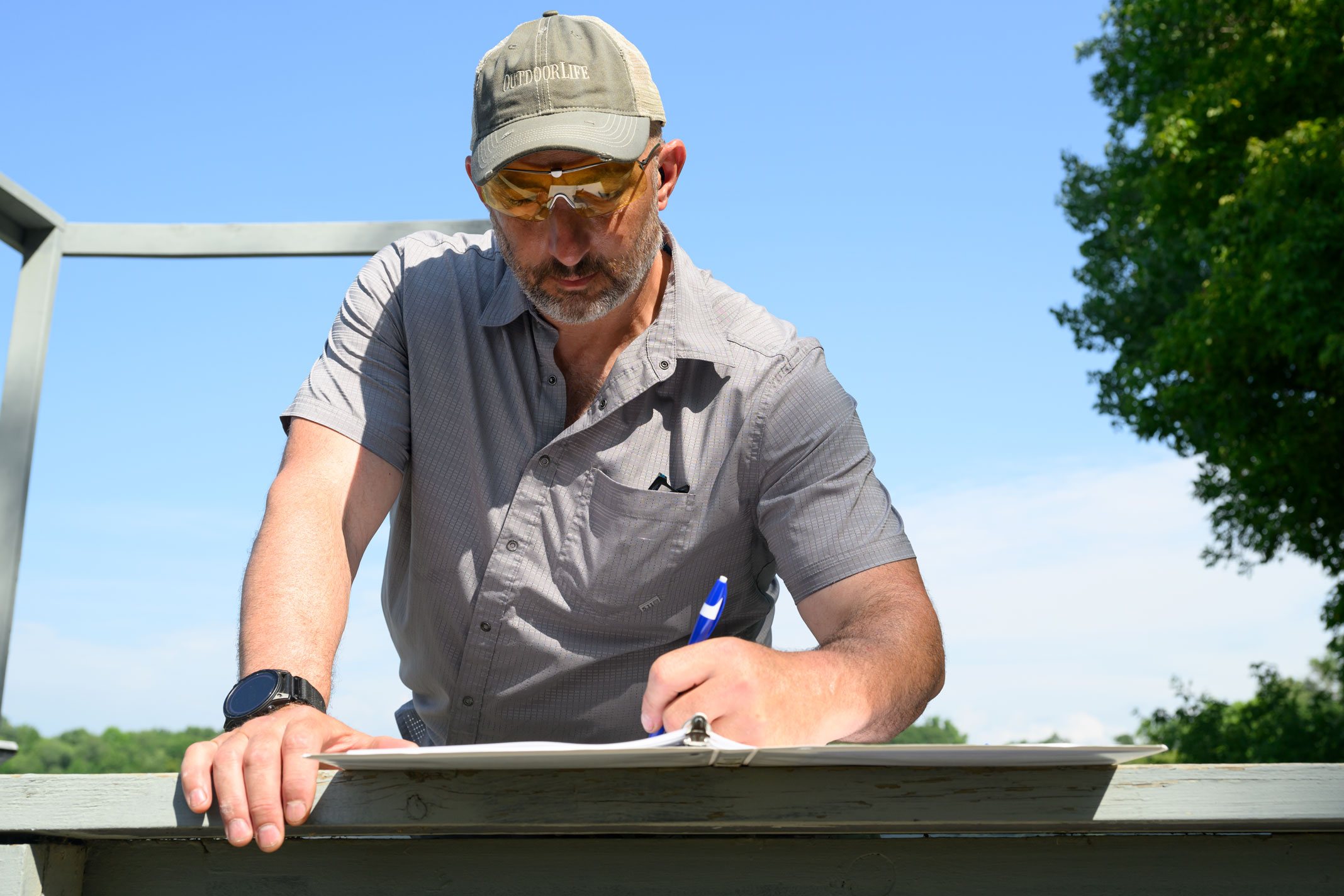
Each shotgun is evaluated on eight categories and given a score of 1 to 5 from each judge. We average the scores for each category and use that to determine the ranking and awards. The categories are handling, workmanship, aesthetics, ergonomics, meets purpose, versatility, reliability, and value.
The scores then translate to the grades on the report cards for each firearm. Performance consists of the scores from handling, ergonomics, and reliability. Design includes workmanship, aesthetics, meeting its purpose, and versatility. Value stands on its own.
To earn an “Excellent” rating, the average of that score must be 4.5 or higher, a difficult mark to hit. “Very Good” is an average score of 3.5 to 4.5; “Good” is from 2.5 to 3.5; “Fair” is from 1.5 to 2.5; and “Poor” is under 1.5.
Editor’s Choice: Browning BPS Field
Report Card
- Performance: Very good
- Design: Good
- Value: Very Good
Specs
- Action: Pump
- Stock: Walnut
- Gauge: 12
- Chamber: 3 inches
- Capacity: 4+1
- Weight: 8.0 pounds (measured)
- Length: 48.75 inches
- Barrel: 28 inches
- Trigger: 3 pounds, 12 ounces (measured)
- Pattern: 90/10
- Price: $800
The Browning BPS Field is by leaps and bounds the most refined pump-action in this test. Where the other shotguns in this field exemplify modern manufacturing techniques and materials—not always to their credit—the BPS is a throwback to the era where glossy wood stocks and rich blued steel ruled the roost.
Take the BPS’s safety, for instance. The small, unobtrusive tab on the back of the receiver blends in with the rest of the shotgun—unlike some “ergonomic” oversized safeties that look like a leech on a summer camper’s leg. It moves from “safe” to “fire” easily, requiring minimal pressure to do so, and clicks into position in a positive manner with audible and tactile feedback.
The action on the bottom-eject BPS, which has made it a favorite of lefties for decades, was the smoothest in the test too. It is also blessed with a crisp trigger that broke at 3 pounds, 12 ounces. When you want to get after it, you can run three rounds through it in a flash. Along with the 870, it did the best job managing recoil in the test.
At the patterning board it delivered 90/10 patterns at 13 yards. That means it put 90 percent of its pattern above the point of aim, which we determined by putting three shots on the board at 13 yards. From a practical standpoint, this will work for a hold where the shooter has the bird or target floating above the front bead.
It was the easiest pump-action to stuff shells into and is certainly the easiest on the eyes.
But the gun has some drawbacks as well. These refinements come at a cost—at $800 it was the most expensive by far. Also, the gun can be a little tricky when feeding the first round into the action. It tends to flip the shell over, causing it to land the wrong way in the action if you aren’t careful.
Finally, the shiny blued barrel and high-gloss stock on our sample cost it points in the versatility category since that’s less than ideal for waterfowling and turkey hunting. Though it is worth noting that current production BPSs (ours dates from a few years back) have more subdued finishes.
That said, the BPS is an excellent choice for someone looking for a pump-action from a more elegant age. It’s also a great option for sub-gauge fans, as it is available in .410, 28, 20, and—going the other direction—even 10 gauge chamberings.
Best Pump Shotgun Value: Remington 870 Fieldmaster
Report Card
- Performance: Very Good
- Design: Very Good
- Value: Excellent
Specs
- Action: Pump
- Stock: Walnut
- Gauge: 12
- Chamber: 3 inches
- Capacity: 3+1
- Weight: 7.7 pounds (measured)
- Length: 48.5 inches
- Barrel: 28 inches
- Trigger: 2 pounds, 12 ounces (measured)
- Pattern: 80/20
- Price: $500
Pump guns don’t get more center of mass than the Remington 870 and it’s good to see that Remington Arms has been able to get production of this iconic shotgun back online as the company works to regain its footing following its recent bankruptcies.
The Fieldmaster replaces the 870 Express, one of the most successful entry-level shotguns ever made. For those familiar with the 870’s taxonomy, the Fieldmaster slots between the basic Express and the higher-end Wingmaster in terms of its feature set. This review of the 870 Fieldmaster gives a detailed breakdown of its construction.
The consensus view of our test team is that the 870 Fieldmaster would be our top choice as an all-around pump gun to hunt with. This judgment was informed by our collective history with the 870 platform and with the shotgun’s performance in this field of guns. “It’s as familiar and comfortable as slipping into a favorite pair of boots,” one tester noted.
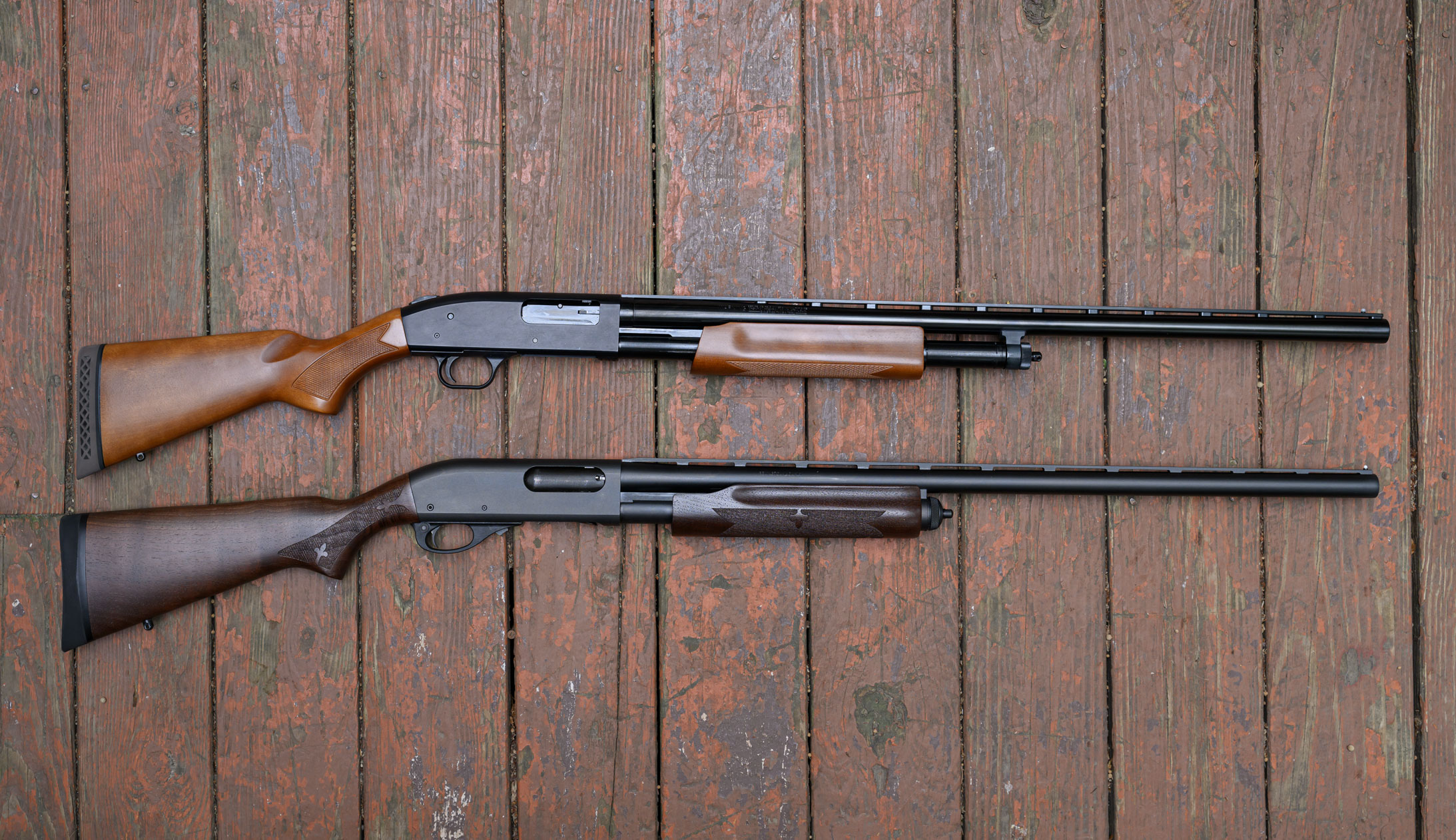
But it wasn’t mere nostalgia that earned the Fieldmaster points. It handled very well on all the targets we flung its way. It has a very good trigger for a pump-action as well. One tester gave the gun high marks for how smooth the safety operated, and it was the easiest and most reliable gun to load in the test.
While we like that the Fieldmaster comes stocked in walnut, the checkering on our sample was pretty dismal. And one judge thought the recoil pad, while effective, was too tacky and tended to hang up on their clothing.
The fact that the receiver is tapped for mounting an optic adds a level of out-of-the-box versatility to the 870 that helped cement its status as the best value of the test.
Benelli Nova
Report Card
- Performance: Good
- Design: Good
- Value: Good
Specs
- Action: Pump
- Stock: Synthetic
- Gauge: 12
- Chamber: 3 ½ inches
- Capacity: 4+1
- Weight: 7.7 pounds (measured)
- Length: 47.5 inches
- Barrel: 26 inches
- Trigger: 6 pounds, 13 ounces (measured)
- Pattern: 80/20
- Price: $619
The Nova is a tale of two guns. The 3-inch version is a good choice for hardcore waterfowling that handles fairly well, is affordable, and has a futuristic aesthetic that appeals to a lot of shooters. But when scaled to a 3 1/2-inch shotgun, the Nova struggles.
Now we won’t get into a debate here whether 3 ½-inch guns are necessary for waterfowling (they aren’t), but the fact is a significant portion of bird hunters feel it is benefit and carry them afield. The Nova is a popular choice for this crowd, but as we saw during this test that extra half-inch comes at cost.
The larger Nova doesn’t point and swing very smoothly. It’s an awkward brute. The action on our sample was sticky, making it a chore to cycle quickly. The safety was a bit gummy, too. This cost it points in the handling category.
There’s no denying its rugged construction, however. The Nova will take a beating and keep banging away. When it slides down a barnacle-covered rock into the salt water while chasing sea ducks you won’t need to worry whether it’ll fire the next shell.
Winchester SXP Black Shadow
Report Card
- Performance: Fair
- Design: Fair
- Value: Good
Specs
- Action: Pump
- Stock: Synthetic
- Gauge: 12
- Chamber: 3 1/2 inches
- Capacity: 4+1
- Weight: 7.1 pounds (measured)
- Length: 49 inches
- Barrel: 28 inches
- Trigger: 4 pounds, 10 ounces (measured)
- Pattern: 60/40
- Price: $410
This pump-action has a rotary bolt system that’s designed to help it cycle quickly. That’s one of the main promises of the SXP platform. The other features are its attainable price—it can be had for less than $350—and its rugged construction.
Even though it is easy on the wallet, it isn’t an easy gun to love. No one on the test team took a shine to the SXP, mostly because it handles and feels like a sub-$400 gun.
The controls on our sample were rough—the safety in particular was difficult to manipulate—and the action wasn’t smooth. It lost points on both its ergonomics and handling.
That said, this 3 ½-inch pump managed recoil well and the trigger, though heavy, is fairly crisp for a gun of this type. And despite our criticisms about its workmanship and aesthetics, we found it cycled and functioned without any issues.
So, if your budget necessitates going with a gun in this price range, you can at least know that what you give up in refinement with the SXP will be offset by its reliability.
Mossberg 500 All-Purpose Field
Report Card
- Performance: Fair
- Design: Fair
- Value: Fair
Specs
- Action: Pump
- Stock: Wood
- Gauge: 12
- Chamber: 3 inches
- Capacity: 5+1
- Weight: 7.9 pounds (measured)
- Length: 47.5 inches
- Barrel: 28 inches
- Trigger: 4 pounds, 8 ounces (measured)
- Pattern: 100
- Price: $504
The Mossberg 500 is a workhorse pump-action that’s been around since the early 1960s and in plain “All-Purpose Field” trim it has a vintage look, from the old-school honeycombed recoil pad to the plain wood stock.
The gun got high marks for its reliability and versatility. It’s got a can-do attitude and is built for hard use. From an ergonomic perspective we liked how simple it is to load and how the large ambidextrous safety, located on the back of the receiver, is easy to find and manipulate.
But this gun isn’t refined in any way. It is blocky, both in its looks and how it handles. One tester described running it as a chore and we all found the slide rough to operate.
The trigger break on our test sample averaged 4.5 pounds but was wildly inconsistent, with some measurements as low as 3 pounds and others north of five.
Compared to other guns costing the same amount, the Mossberg 500 All-Purpose Field could use some upgrades if it is to attract new shooters down the line. Though for specific end users—turkey and deer hunters, for instance—there are 500s that come tricked out for those applications that are worth considering.
Stoeger P3000
Report Card
- Performance: Poor
- Design: Poor
- Value: Fair
Specs
- Action: Pump
- Stock: Synthetic
- Gauge: 12
- Chamber: 3 inches
- Capacity: 5+1
- Weight: 6.9 pounds (measured)
- Length: 49.5 inches
- Barrel: 28 inches
- Trigger: 5 pounds, 6 ounces (measured)
- Pattern: 50/50
- Price: $319
The Turkish-made Stoeger M3000 pump’s only virtue is its bargain-basement price. It is a functional gun that is affordable but doesn’t bring much else to the party.
Its action was rough, it delivered the harshest felt recoil among the guns in the test (in part because of the poor quality of the recoil pad), loading it was difficult, the crossbolt safety is stiff to run both ways, and the trigger pull was sub-par.
In short, even for the price we can’t recommend it.
Final Thoughts on the Best Pump Shotguns

The saying there’s no such thing as a free lunch applies to this field of pump-action shotguns. You’ll hear older generations speak fondly of the $199 pump guns they purchased 25 years ago ($373 in today’s money) that still run well. That level of performance for the price no longer exists.
- Best Pump Shotgun Overall: Browning BPS
- Great Buy: Remington 870 Fieldmaster
- Benelli Nova
- Winchester SXP Black Shadow
- Mossberg 500
- Stoeger P3000
Good Used Pump Shotguns
Though you can look to the used gun market to find one of these classics. Going this route, pump shotguns to look for include the Remington 870 Wingmaster, Winchester Model 12, Remington 31, Winchester 1200/1300, and Ithaca 37.
The best value of the test for new guns was without question the Remington 870 Fieldmaster, which will set you back $500. When you start looking at new pump shotguns that cost less than that, you’re going to make some sacrifices. And if you want something that’s more refined, such as the Browning BPS, expect to open your wallet wider still.
